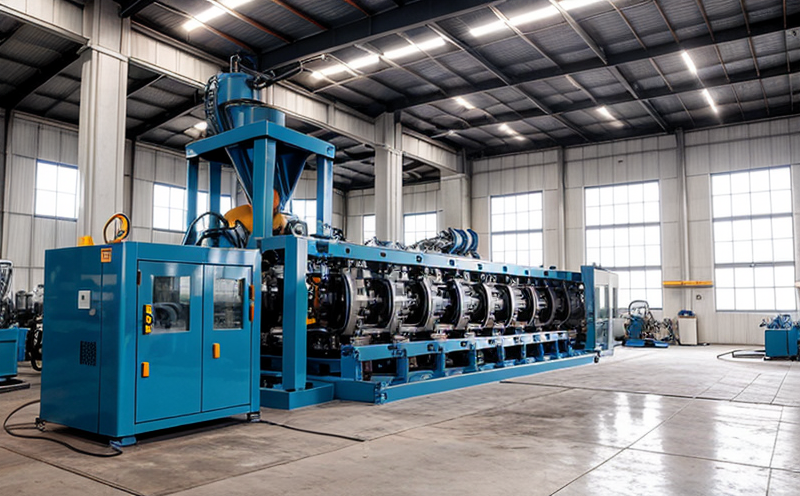ASTM E18 Rockwell Hardness Performance Testing of Machine Parts
The ASTM E18 standard is a widely recognized method used to measure the hardness of metallic materials, including machine parts. This testing procedure involves applying a load with a specific indenter onto the surface of the specimen until it penetrates by a certain depth. The resulting hardness value represents the material's resistance to indentation.
The Rockwell hardness test is versatile and can be used across various sectors such as automotive, aerospace, and manufacturing. It provides valuable insights into the mechanical properties of machine parts, which are crucial for ensuring their durability, reliability, and overall performance under operational conditions. By testing these components according to ASTM E18 standards, manufacturers can validate that their products meet quality specifications and regulatory requirements.
The Rockwell hardness test is particularly useful when evaluating critical components like gears, bearings, shafts, and other rotating machinery parts. These elements are subjected to high stress levels during operation, making it essential to assess their ability to withstand wear and tear without compromising safety or efficiency.
During the testing process, specimens must be prepared according to prescribed procedures outlined in ASTM E18. This typically involves cleaning the surface of the part thoroughly before applying the specified indenter with a specific force. The depth of indentation is then measured using precision instruments calibrated specifically for this purpose.
The hardness value obtained from ASTM E18 testing can help determine whether machine parts meet industry standards or exceed expectations in terms of performance and longevity. For instance, if a gear has been found to have insufficient hardness levels based on ASTM E18 results, manufacturers may need to adjust manufacturing processes or select different materials with higher strength properties.
By incorporating ASTM E18 Rockwell hardness testing into their quality control procedures, companies can ensure that all machine parts meet stringent requirements set forth by international standards. This approach not only enhances product reliability but also contributes positively towards maintaining customer satisfaction and trust in brand reputation.
Customer Impact and Satisfaction
The implementation of ASTM E18 Rockwell hardness testing has a significant impact on customers by ensuring the quality and performance of machine parts used in various industries. By adhering to this standard, manufacturers are able to produce products that meet or exceed industry expectations, thereby enhancing overall customer satisfaction.
- Improved Product Reliability: Testing ensures that critical components such as gears and bearings can withstand the stresses encountered during operation without failing prematurely. This leads to longer-lasting machinery with reduced downtime and maintenance costs for end-users.
- Increased Customer Confidence: Compliance with recognized standards like ASTM E18 builds trust between manufacturers and their customers, fostering long-term relationships based on reliability and quality.
- Enhanced Reputation: Consistently meeting or exceeding industry benchmarks through rigorous testing practices helps establish a positive reputation among clients and stakeholders within the sector.
In summary, ASTM E18 Rockwell hardness testing plays an integral role in maintaining high standards of product quality across different industries. Its adoption contributes positively towards improving customer satisfaction while enhancing brand loyalty and business growth opportunities.
International Acceptance and Recognition
- The ASTM E18 standard is widely accepted globally, particularly in countries adhering to North American standards. It has been recognized by organizations such as the International Organization for Standardization (ISO), which contributes to its widespread adoption.
- This standard has gained prominence in various sectors including automotive manufacturing, aerospace engineering, and general industrial machinery production. Its broad acceptance ensures that results from ASTM E18 tests are universally applicable across different regions and applications.
The ASTM E18 Rockwell hardness test is a crucial tool used by industries worldwide to assess the mechanical properties of metallic materials. Its international recognition underscores its significance in ensuring consistent quality standards, particularly when dealing with components that experience high-stress environments.
The widespread adoption of ASTM E18 has led to harmonization between different national and regional testing methods, promoting interoperability among various manufacturers and suppliers operating within diverse geographical areas. This standardization facilitates easier collaboration and exchange of information across borders, ultimately benefiting both producers and consumers alike.
Use Cases and Application Examples
| Machine Part | ASTM E18 Hardness Range | Testing Parameters |
|---|---|---|
| Gear | HRC 45-60 | Indenter: Steel Ball, Force: 98.07 N |
| Bearing | HRC 52-62 | Indenter: Diamond Cone, Force: 196.12 N |
| Shaft | HRC 30-45 | Indenter: Steel Ball, Force: 98.07 N |
- Gearboxes: Ensuring proper meshing and efficient power transfer requires accurate assessment of hardness in gears.
- Bearings: Testing the bearing's ability to support heavy loads without excessive wear is critical for maintaining smooth operation.
- Shafts: Shaft integrity is vital for preventing failures that could lead to catastrophic breakdowns during use.
The ASTM E18 Rockwell hardness test provides precise measurements needed to evaluate these machine parts' performance under real-world conditions. These tests help identify potential issues early on, allowing manufacturers to make necessary adjustments before products reach the market.





